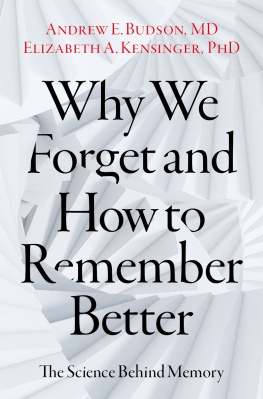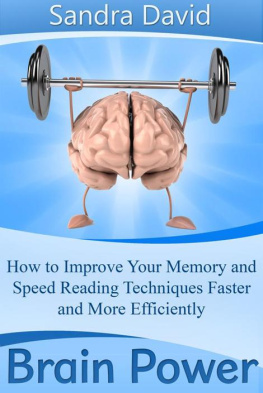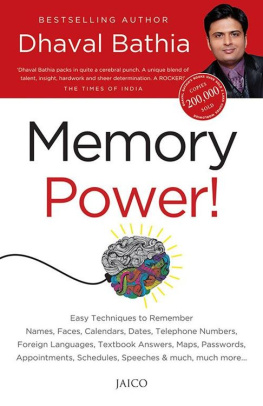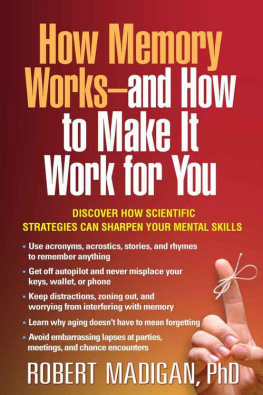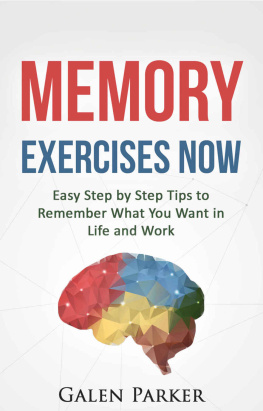
Many of the designations used by manufacturers and sellers to distinguish their products are claimed as trademarks. Where those designations appear in this book and Da Capo Press was aware of a trademark claim, the designations have been printed in initial capital letters.
Copyright 1977, 1988, and 1996 by Kenneth L. Higbee
Preface copyright 2001 by Kenneth Higbee
All rights reserved. No part of this publication may be reproduced, stored in a retrieval system, or transmitted, in any form or by any means, electronic, mechanical, photocopying, recording, or otherwise, without the prior written permission of the publisher. Printed in the United States of America. For information, address Da Capo Press, 11 Cambridge Center, Cambridge, MA 02142.
Cataloging-in-Publication data for this book is available from the Library of Congress.
ISBN: 978-0-73821-297-5
Published by Da Capo Press
A Member of the Perseus Books Group
www.dacapopress.com
Note: The information in this book is true and complete to the best of our knowledge. This book is intended only as an informative guide for those wishing to know more about health issues. In no way is this book intended to replace, countermand, or conflict with the advice given to you by your own physician. The ultimate decision concerning care should be made between you and your doctor. We strongly recommend you follow his or her advice. Information in this book is general and is offered with no guarantees on the part of the authors or Da Capo Press. The authors and publisher disclaim all liability in connection with the use of this book. The names and identifying details of people associated with events described in this book have been changed. Any similarity to actual persons is coincidental.
Da Capo Press books are available at special discounts for bulk purchases in the U.S. by corporations, institutions, and other organizations. For more information, please contact the Special Markets Department at the Perseus Books Group, 2300 Chestnut Street, Suite 200, Philadelphia, PA, 19103, or call (800) 810-4145, extension 5000, or e-mail .
20 19 18 17 16 15 14 13 12
To Dawn, Janelle, Loren, and Lana, who have accepted their roles as children of a memory researcher and willingly (?) tried many of the techniques in this book.
Contents
T his printing commemorates the twenty-fifth anniversary of my book, the year 2001 marking a quarter of a century that the book has been in print. The first edition was published in 1977, and the second edition in 1988. Based on recent research and on feedback from readers of the book, the content (myths, principles, methods, techniques, and systems) and the organization of the book are still as useful as ever. The only aspect of the book that has shown its age is the research references, which are more of academic interest to memory researchers than of practical interest to most readers who want to improve their memories.
I continue to receive feedback on the book from many kinds of readers. They include hundreds of students in more than three dozen memory-improvement classes I have taught, hundreds more students in my correspondence course, teachers of other memory improvement classes, and people who read the book on their own to improve their memories. To the half-dozen comments from students that already appear in the Introduction describing benefits that readers get from the book and the courses based on it, I can add another handful;
I am definitely amazed. I never knew my mind had so much power.
After this course I find myself in a new world.
Ive always considered myself to have a poor memory. With these skills its like a cloud has been lifted from my mind.
This class has been the best experience that I have ever had in my entire educational past!
I was surprised and excited by how easy and fun the systems were to use.
I have taught some of my kids ways to remember things. It has especially helped my daughter who has a mild reading disability.
Feedback from other memory teachers and researchers also supports the continued usefulness of the book. This recent comment by Dr. Michael Gruneberg at the University of Wales is representative (Dr. Gruneberg is a past president of the international Society for Applied Research in Memory and Cognition.):
Ken Higbees book is easily the most extensive scientific analysis of the value of memory strategies. But the book is far more than this since it is written in such a way as to allow the lay readers to see how best they can improve their own memory based on a careful consideration of scientific fact rather than mere showman hype. Ken Higbee has done more than any other psychologist to show that the scientific study of memory strategies should be taken seriously by any serious student of memory.
In addition to teaching memory improvement, I have also continued to research memory improvement. This enables me to keep a scholarly base as well as a practical base to my teaching (one of the unique features of this book that is noted in the Introduction). Since the second edition was first printed, I have reported my memory research in more than a dozen research conferences in seven states and four other countries. Some of this research is represented by the selected articles I have added to the Chapter Notes at the end of the book; those articles cover such topics as the role of this book in my memory courses, benefits students get from reading the book, the ten-percent myth ().
Im pleased to be able to guide you on your journey to improve your memory. I think youll find the trip both enjoyable and worthwhile.
Ken Higbee
September 2000
W hat is memory? Why do you remember some things and forget others? How can you remember more? Does it depend on what you learn? Does it depend on how you learn? Were you born with a good or a bad memory? Can a bad memory be improved? Can you develop a photographic memory? How can you study more effectively? What are mnemonics? Can mnemonics improve your memory in everyday life? How can you set up and use your own mental filing system? Can mnemonics help you to remember peoples names, to overcome absentmindedness, and to succeed in school? These are just a few of the questions that will be answered in this book.
My interest in questions such as the ones above began when I first read a book on memory improvement as a student in high school. I was amazed at the things I could do with my memory by using mnemonic techniques. Through the years I have continued to add memory books to my personal library, and to learn and use new memory systems and techniques. My reading of popular books on memory improvement has supplemented my academic research and professional training as a psychologist, giving me a balanced perspective between the popularized treatments of memory training and the scientific research on learning and memory. That balance is reflected in this book. I am a university professor of psychology who has a serious teaching and research interest in memory improvement: I am not primarily a memory performer or a self-proclaimed expert with the greatest memory in the world. (There are already plenty of those experts around!)
Next page

